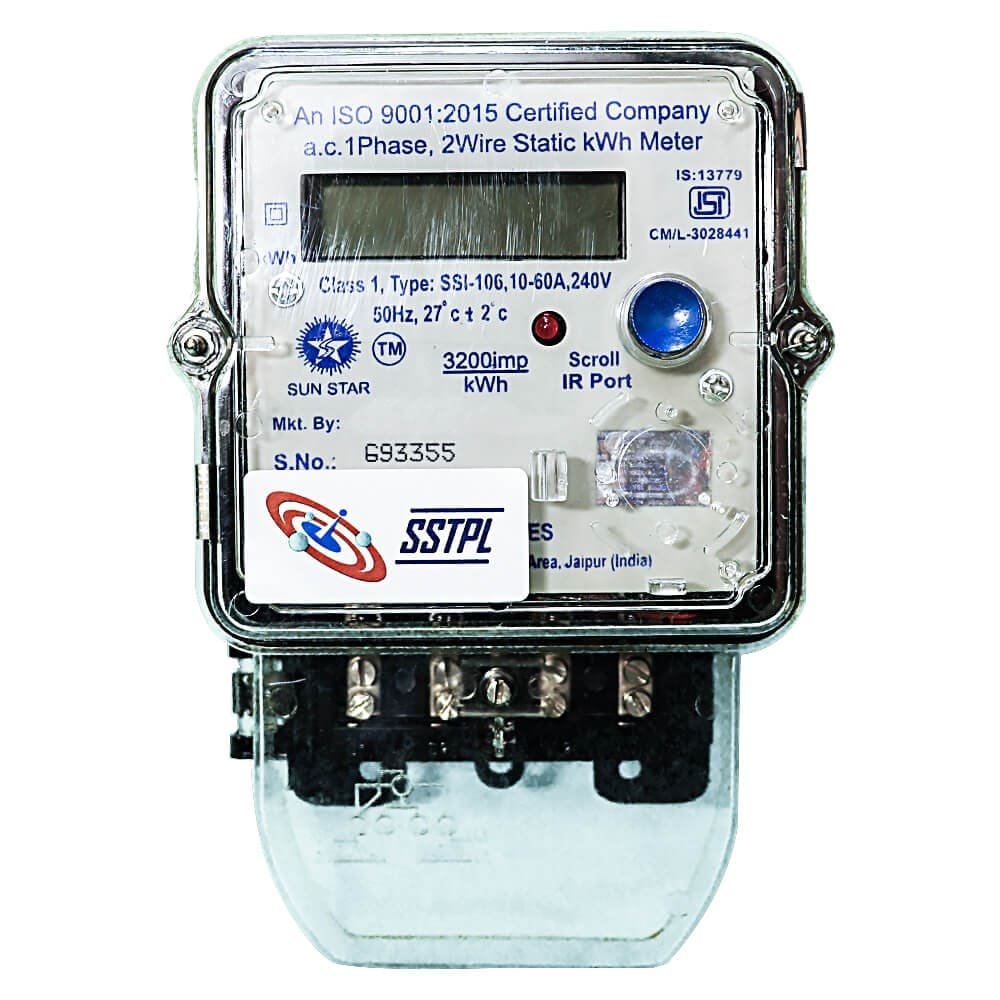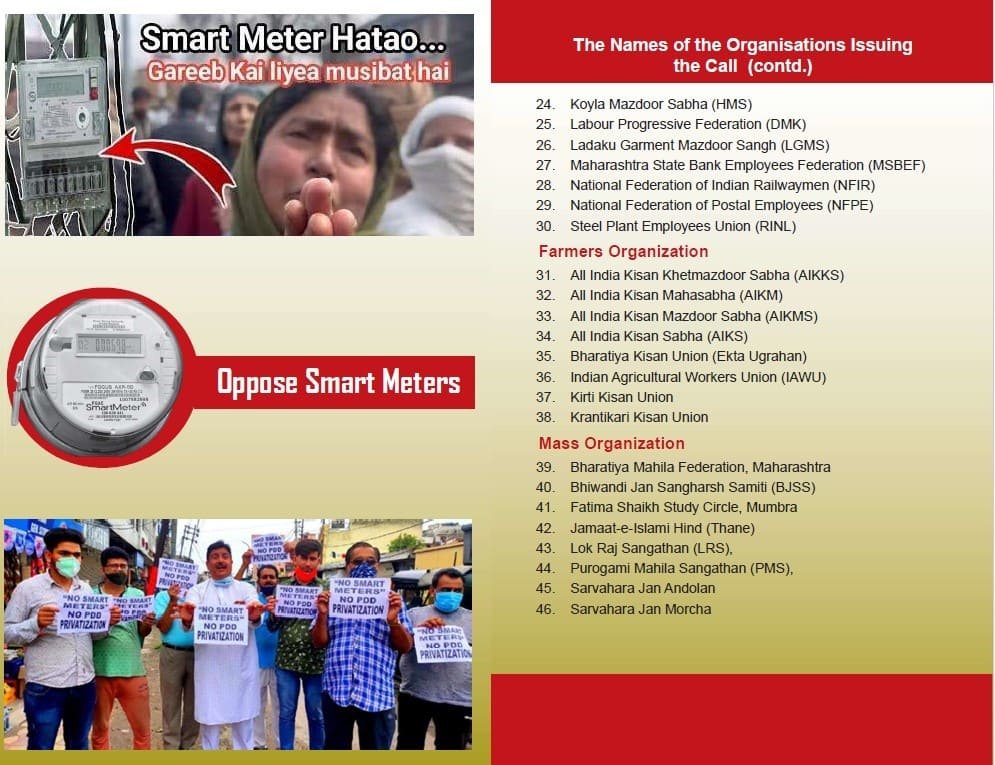Report by Kamgar Ekta Committee (KEC) correspondent

“Oppose the anti-worker, anti-people smart electricity meters!” This was the title of the successfully organised Zoom meeting by the AIFAP on Sunday, 14th April 2024. Com. Mathew, the Convener of AIFAP and the Secretary of Kamgar Ekta Committee (KEC), welcomed the participants and gave an introduction to the new attack planned on the workers and consumers by the ruling class in the interest of big monopoly corporations. He then called in turn the eminent speakers of the day, Shri Shailendra Dubey, Chairman of the All India Power Engineers Federation (AIPEF), Shri Prasanta Chaudhary, Convener, National Coordination Committee of Electricity Employees and Engineers (NCCOEEE), Shri Hannan Mollah, Vice President, All India Kisan Sabha (AIKS) and Shri Ashok Kumar, Joint Secretary of KEC.
The presentations of all the speakers were listened to with great interest and they are being put up on the AIFAP website one by one.
Com. Mathew announced that it augurs well for the working class of our country that 45 organisations of workers, national level federations and unions as well as people’s organisations have responded enthusiastically to the KEC’s initiative of bringing out a booklet on the subject in many languages to educate activists, members and people at large on the issue of smart meters in order to build up a strong, country-wide movement against them.


A large number of participants were eager to express their views and they contributed to the success of the meeting.
Everyone agreed that smart meters are a way to benefit the corporates at the expense of the people: to loot all the people even more as well as to pave the way for electricity privatisation.
The meeting ended with Dr. Mathew reiterating the determination that many had expressed of strengthening the fight and stopping the installation of smart meters.
The important points made by the speakers are given below.
A bit of history
- Before independence, electricity was in private hands.
- With the passing of the EA (Electricity Amendment) Act in 1948, SEBs (State Electricity Boards) were established. The declared objective was socio-economic development. There was no talk of making profit. As a result, electricity reached almost everywhere in the country.
- In 1985 the Act was amended; Electricity Boards were allowed to make what was labelled surplus of 3%, but which actually meant profit.
- In 1991, the privatisation of electricity generation began. It led to the infamous Enron project due to which MSEB was forced to purchase power at Rs. 85 (!!!) per unit from it.
- Unlike for SEBs, there is no universal power obligation for the private sector. That is why the private sector can pick and choose the most profitable consumers.
- NCCOEEE was formed on 13th April 2000, but despite its opposition, the Electricity Amendment Act was passed.
- In an attempt to further help the corporates, the government has been trying to pass the EAB (Electricity Amendment Bill) since 2014, but it has been unsuccessful due to the strong fight put up by workers, farmers and people at large.
- Now they are trying to circumvent this by using the EA Rules for privatisation.
Why smart meters are anti-worker, anti-people
- According to the RDSS scheme, through which smart meters are planned to be installed, public money will be used to build the infrastructure that will earn enormous profits for the corporates in this sector.
The claim that electricity will become cheaper with privatisation in general and smart meters in particular, is a lie:
- Electricity in Mumbai has been private since independence. Power rates in Mumbai are among the highest in the country despite competition between Tata and Adani.
- 85% of the charge is due to generation, more than 50% of which is already in private hands.
- AT&C losses have been cut down from 40% to 17%, but the consumers have not benefitted.
- The experience of franchisee electricity consumers, wherever they are in the country is very bad.
- Today rates are different for different categories of consumers; they are less for those who consume less, the poorer people.
- Under the new scheme almost all subsidies will be removed; if states want to give subsidies it has to be through DBT (direct benefit transfer) only. We all know what happened to the DBT for gas cylinders. Now hardly anyone gets the subsidy.
- In the case of prepaid meters, the consumer has to pay before using. Not only will this be bad for consumers, but lakhs of workers working for meter reading, billing and bill collection will lose their jobs.
- Prices will rise further through the ToD (Time of Day) rates. Rates will be more when the demand, that is the need, is more.
- Today the tariff rates can be changed only after approval by the state Regulatory Commissions. If smart meters are installed, rates could be changed every second, without the knowledge of the user!
All this will effectively mean that electricity will go out of the hands of the crores of poor people!
What should we do?
- We need to launch a country-wide campaign to educate firstly the workers and also the consumers about how smart meters will harm them.
- The recent booklet on the issue would be very helpful and organisations should order it and educate their members.
- We should hold more meetings, distribute leaflets, and so on about the issue.
- In Punjab and in some places in UP, where smart meters were installed, farmers removed them and handed them over to the company. Such struggles need to be publicized.
- We need to question the total lack of accountability of the government and the authorities. If our country is a democracy, as is claimed, why did farmers have to struggle for so long and so hard for their demands (one of which was to scrap the EAB)? Why did over 700 of them have to die for that?
- How is it that the government can go scot free after reneging on its written promises?
- Time and again we find governments and other authorities lie to the people, as in the case of smart meters. Should that not be a crime? Where is the mechanism to hold them to account and punish such crimes?
Today power is concentrated in the hands of the corporate sector. Not just in these ten years, but for decades we have seen how various governments have worked for the benefit of corporates, against the people. We need to develop the fight for a system in which all of us, the crores of workers, farmers and other toilers will have a decisive say in how the country is run!
